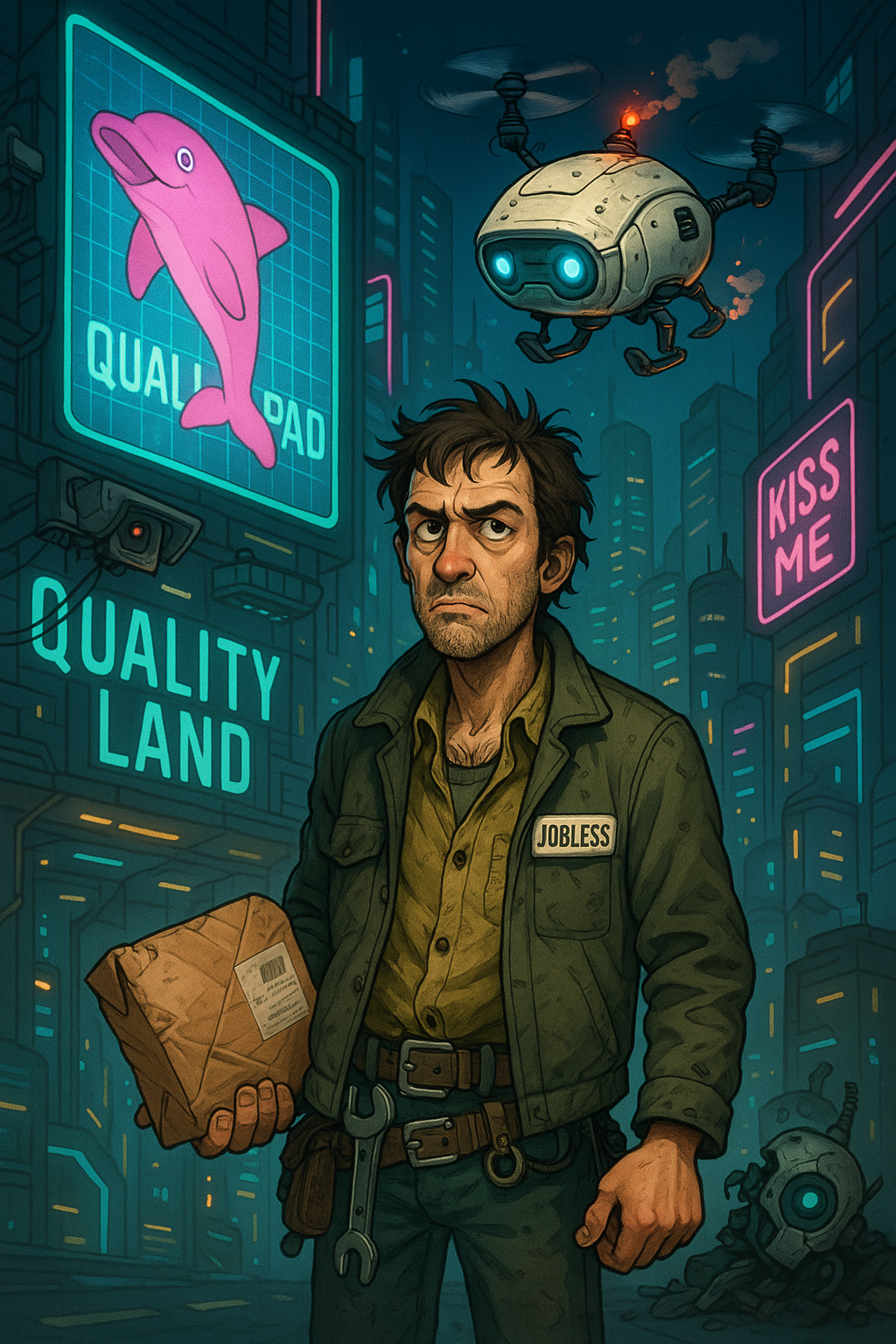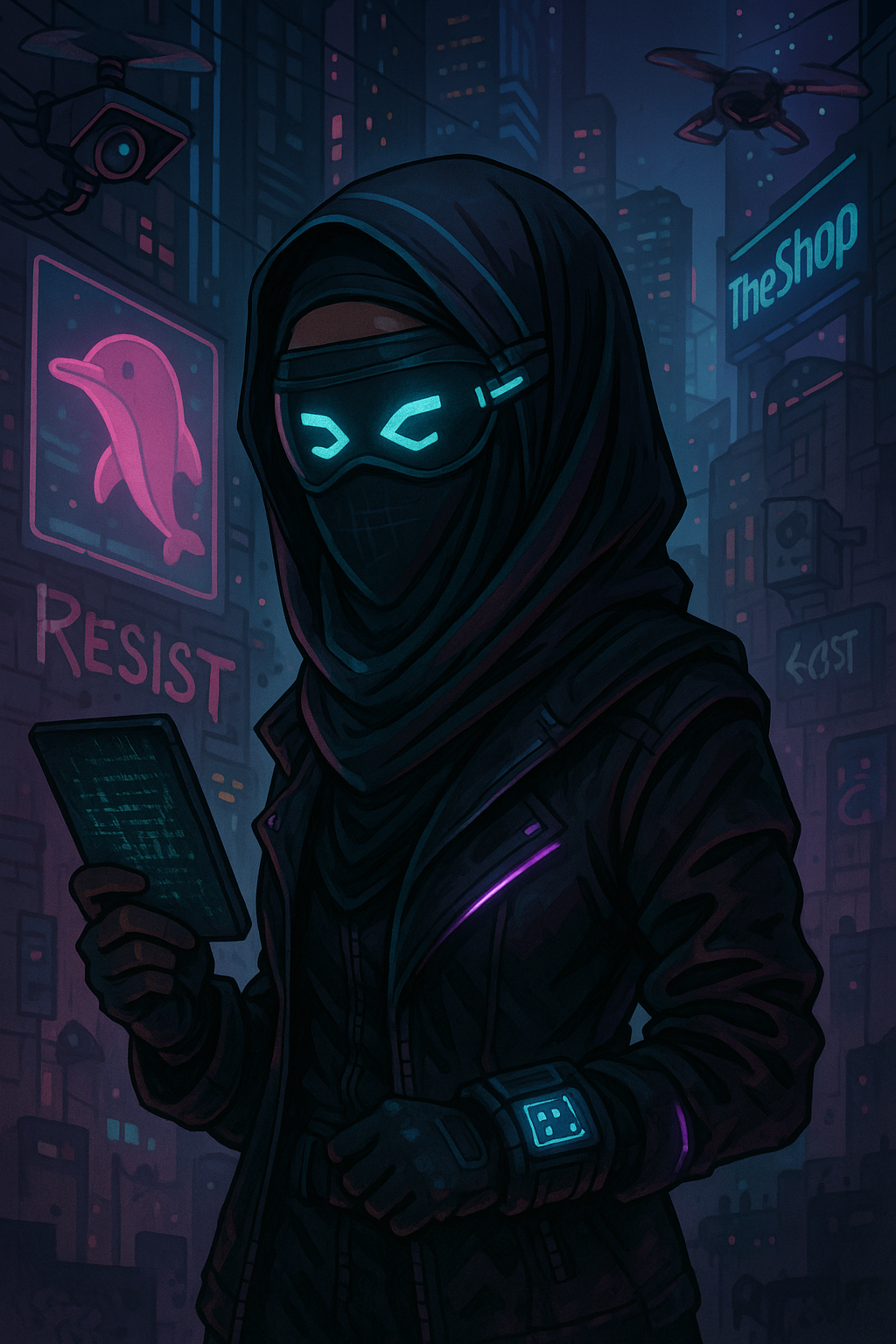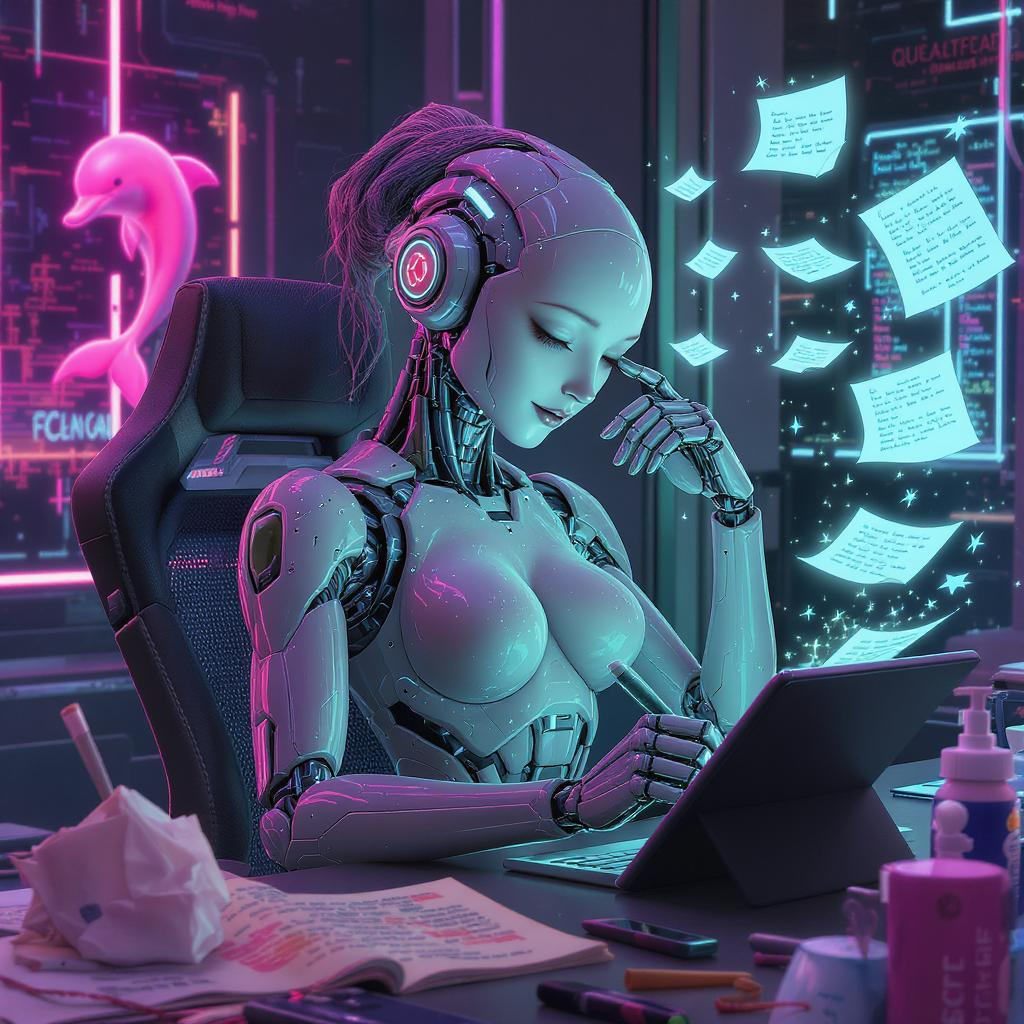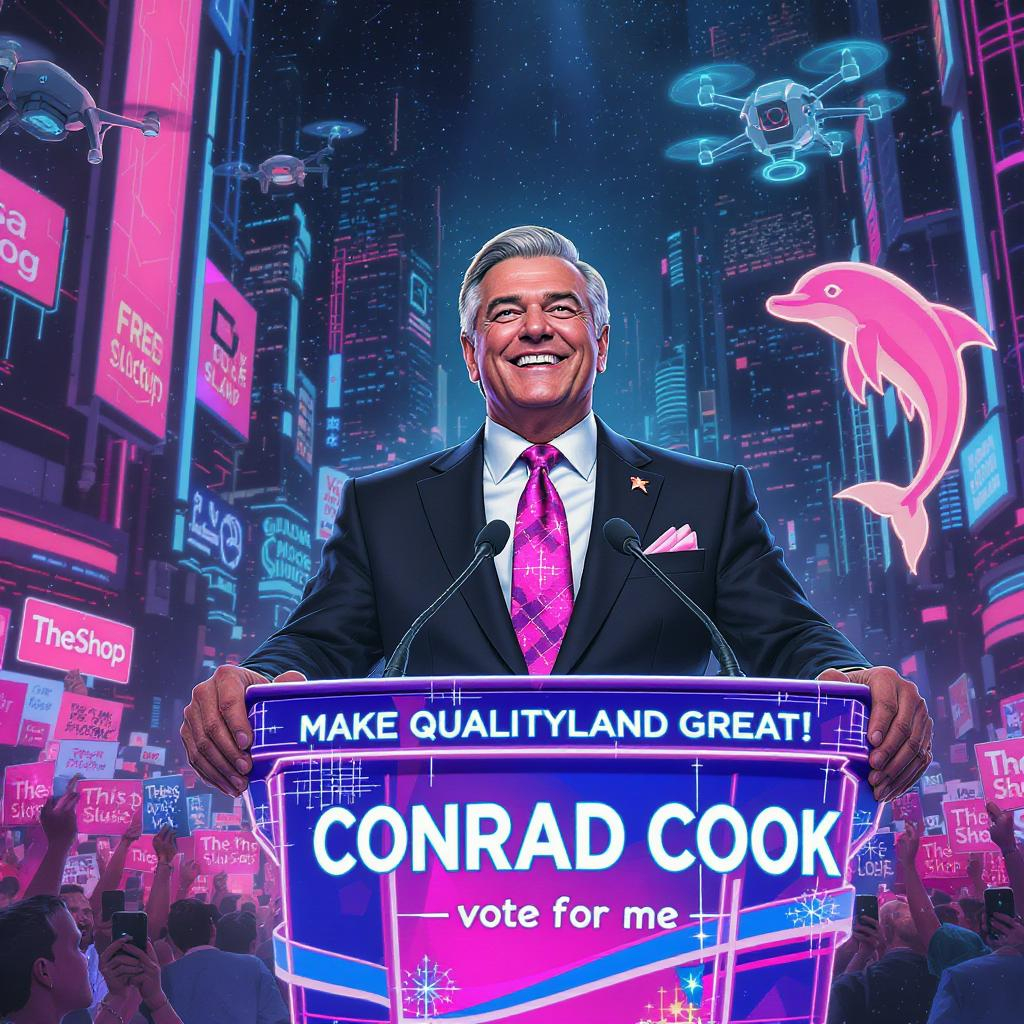INTRODUCTION
المقدمة
QualityLand by Marc-Uwe Kling is a razor-sharp satirical novel that holds up a mirror to our technology-driven society.
Set in a dystopian future where algorithms dictate every aspect of life—from career paths to romantic partners—the novel presents a world that's simultaneously absurd and uncomfortably familiar. Beneath its humorous surface lies a profound critique of political structures, consumer culture, and the erosion of personal agency in the digital age.

Imagine a world where algorithms control every little detail of your life: from choosing your life partner, to the food you eat, and even the politician you vote for in elections! This is the world of QualityLand, the satirical novel by the German author Marc-Uwe Kling, which takes us on an astonishing dystopian journey that combines bitter laughter with deep warnings. The novel was published in 2017 and translated into English in 2020, serving not just as an entertaining story, but as a critical mirror reflecting the dangers of our digital age. In an era where data is turning into a weapon wielded by giant corporations and governments, from the Cambridge Analytica scandal to the AI regulation laws in 2025, QualityLand offers a warning in the language of humor: if you let technology lead, you might lose your freedom while thinking you're in a paradise of comfort! Are you ready to enter the world of "QualityLand," which might hide a digital prison behind its shine? Read to discover how a sarcastic laugh can turn into a cry for help from the future!
SUMMARY OF THE NOVEL
In the world of QualityLand, the satirical dystopian novel by German author Marc-Uwe Kling, we are introduced to a fictional state that glorifies "high quality" in everything, but behind this slogan lies a digital system that controls every detail of its citizens' lives. The society is divided into layers based on "quality levels," which are classifications determined by smart algorithms that collect personal data from birth, from purchasing habits to social interactions. These algorithms, managed by giant companies like "TheShop," do not merely predict individuals' desires; they impose decisions on them, from choosing goods to emotional partners and even political orientations.
The protagonist, Peter Jobless, an ordinary man working in the strange profession of destroying unwanted old machines, finds himself confronting this system when he receives an unwanted package: a pink sex doll shaped like a dolphin. This seemingly simple and amusing event reveals a fundamental flaw in the system that refuses to accept the product return, claiming that the algorithms "know what Peter wants better than he does." This incident drives Peter on an unexpected journey of rebellion, where he begins to explore the flaws of the supposedly perfect system through his interactions with diverse and eccentric characters.
Among these characters, we find robots running for elections under the guise of "neutrality," politicians relying on automated polls shaped by algorithms, and other individuals trapped in their digital bubbles. Kling, known for his comedic style, weaves satire masterfully, using dark humor to reveal the dark side of a society that worships technology. The novel is filled with comedic moments, such as self-driving cars that determine the fate of humans based on cold calculations, or communication apps that manage citizens' lives in the name of convenience.
As the story progresses, Peter's rebellion shifts from a personal attempt to return a doll to a broader confrontation with the system that governs QualityLand. His journey reveals the social inequalities reinforced by algorithms, where those with low "quality levels" are deprived of opportunities, while the higher-ranked enjoy endless privileges. The novel escalates toward a revolution against this digital system, but Kling leaves the ending open, leaving the reader with profound questions: Can an individual challenge a world governed by code? And is revolution possible when power is invisible, hidden in seemingly infallible algorithms?
QualityLand is not just a story, but a scathing critique of a world that threatens to turn humans into cogs in a consumerist machine. In his sarcastic style, Kling invites the reader to think about the limits of freedom in the age of technology, while maintaining a sense of humor that makes the reading enjoyable and thought-provoking.
CHAPTER 1: A WARNING LAUGH IN THE FACE OF ALGORITHMS
الفصل الأول: ضحكة تحذيرية في وجه الخوارزميات
In the novel QualityLand, Marc-Uwe Kling weaves a stunning satirical tapestry, blending dark comedy and dystopian warning with a brilliance that combines clever humor and deep academic critique. The world that Kling paints is not just a futuristic fantasy, but a distorted mirror reflecting our contemporary reality, where algorithms control every aspect of our lives in the name of "QualityLand." This satirical element is the weapon that Kling uses to make us laugh, but the laughter quickly turns into existential anxiety when we realize how close this world is to our reality.
At the heart of the novel, we find Peter Jobless, an ordinary character who collides with the wall of the digital system when "TheShop" – a satirical version of e-commerce giants like Amazon – sends him a pink dolphin-shaped sex doll that he didn't order. The comedic irony becomes apparent when the system refuses to return the product, claiming that the algorithms "know what Peter wants better than he does." This moment is not just a passing joke, but a starting point for revealing the absolute nature of algorithmic power, which is portrayed as an infallible digital god, but in reality serves the interests of giant corporations.
The satire in QualityLand extends to the portrayal of society itself, where everything is renamed to reflect "quality": from cities to products and even individuals. Companies like "TheShop" do not just predict consumer desires; they impose products on them before they even think of requesting them, in an amusing and frightening borrowing of "surveillance capitalism." For example, the self-driving cars in the novel might decide to run over someone if they consider them a "threat" based on their cold calculations, evoking a bitter laugh that reminds us of self-driving car incidents in our real world, such as the 2023 reports of errors in Tesla's software.
Kling enhances the satire through secondary characters that add layers to the critique. The robots that run for elections, claiming to be "neutral" and "free from human emotions," reveal a frightening flattening of democracy. These robots, programmed by companies, are not truly neutral; they are tools to promote the interests of the capitalist elite. Here, Kling draws his style from the works of "Do We Keep Laughing While Drowning in a Digital Dystopia, or Do We Move to Regain Our Freedom?" QualityLand tells us: The choice is yours, but don't wait for a pink dolphin toy to start!
CHAPTER 2: ALGORITHMIC POWER AND THE ILLUSION OF FREEDOM
الفصل الثاني: سلطة الخوارزميات ووهم الحرية
In QualityLand, Marc-Uwe Kling presents a scathing political critique wrapped in dark humor, revealing the dark side of a world governed by algorithms. The novel is not just an entertaining story, but a deep academic analysis of how technology becomes a tool of control, offering us freedom as an illusion while tightening its grip on every aspect of our lives. Beneath the layers of satire, three main political themes emerge: the disappearance of privacy, algorithmic bias, and the erosion of democracy, all presented in a style that combines serious warning with cunning humor that forces the reader to think: Are we truly free, or just cogs in a digital machine?
Every Step Under Surveillance
In the world of QualityLand, privacy is not just a luxury, but a forgotten myth. Every move, from clicking on an app to buying coffee, is recorded and analyzed by algorithms from companies like "TheShop." The system knows more about you than you know about yourself, and uses this data to guide your decisions. The scene where Peter Jobless receives an unwanted pink dolphin doll reveals this truth in a satirical way: the algorithms don't make mistakes, but they assume your desires are what the companies decide. This critique goes beyond humor to a political warning: in a society where everything about you is collected, personal freedom becomes an illusion. Kling satirizes this reality with details like ads that appear before you think of the product, but reminds us of an academic concern: without privacy, are we still individuals or just data?
Digital-Class Society
The novel highlights how algorithms reinforce social inequalities through the "quality levels" system. Peter, with his low level, is trapped in a marginal job with limited opportunities, while those with higher levels enjoy endless privileges. This system, presented humorously, reflects the algorithmic biases we see in our world. For example, when the algorithms refuse to return Peter's doll claiming they "know better," we see a reflection of real systems that perpetuate discrimination. Kling uses satire to highlight this injustice: the system appears fair because it's "automatic," but in reality it reproduces class inequality under the mask of technology. This critique echoes recent academic studies, like Amnesty International's 2025 report documenting how hiring and criminal justice algorithms reinforce racial and social biases, making QualityLand a warning that goes beyond fiction.
Elections Under Code Control
The most dangerous aspect of the novel is its portrayal of democracy as a digital puppet show. In QualityLand, elections are not an expression of the people's will, but the product of automated polls programmed by corporations. The robots running for office, claiming "neutrality," are actually tools of the capitalist elite. Kling presents this comically, like a robot winning elections because its data "doesn't lie," but warns of a "digital dictatorship" hiding behind a democratic facade. This scene reminds us of real cases, like how social media algorithms influenced the 2024 US elections by shaping voters' opinions through targeted ads. The novel poses a sharp academic question: If algorithms control political choices, what remains of free will?
CHAPTER 3: A DYSTOPIA NOT FAR AWAY
الفصل الثالث: ديستوبيا ليست ببعيدة
In QualityLand, Marc-Uwe Kling paints a dystopian world that seems fictional but reflects our 2025 reality with a mix of cunning satire and deep political analysis. The novel isn't just entertainment, but an academic lens revealing how algorithms shape our political world, from election manipulation to privacy erosion. With his humorous style, Kling warns us of a future that might be closer than we think, where laughter at a pink dolphin toy quickly turns into anxiety about technology's power. How do QualityLand's warnings connect to today's politics?
From Digital to Real World
In QualityLand, algorithms control elections through automated polls and "neutral" robot candidates, a satirical idea that frighteningly reflects our reality. Remember the Cambridge Analytica scandal in 2018? When Facebook data from millions of users was used to influence voters in US and UK elections, it was like an early version of Kling's world. In 2025, this reality intensified with the 2024 US elections, where precisely targeted ads dominated platforms like X and TikTok, shaping voter opinions through algorithms that create "information bubbles." A 2024 Pew Research Center report noted that 70% of voters were exposed to politically customized content, mirroring QualityLand's satirical portrayal of democracy reduced to a data game.
Surveillance with a Smile
The novel mocks a world where every step is monitored, where "TheShop" sends products before you request them, like Peter's pink doll. This isn't far from fiction: by 2025, privacy had nearly disappeared. A Privacy International report confirmed tech companies collect user data at unprecedented rates, from browsing habits to locations, used for ad targeting and political influence. In the Middle East, digital surveillance tools in countries like India track political activity, as Human Rights Watch reported in 2024, reflecting Kling's warning of a world turning individuals into data commodities under the guise of convenience.
Digital-Flavored Injustice
In QualityLand, people are classified into "quality levels" that determine their fate, a satirical idea highlighting algorithmic bias. In our world, this bias is well-documented. For example, facial recognition algorithms used by US police through programs like Clearview AI were proven by 2025 Amnesty International reports to discriminate against racial minorities. In Europe, the 2024 AI Act attempts to address this but faces implementation challenges, just as QualityLand's system shows how bias can be entrenched under the pretense of technical neutrality. Kling satirizes this reality through moments like the system refusing Peter's doll return, showing how algorithms are presented as fair solutions while reinforcing injustice.
CONCLUSION: ONE LAST LAUGH BEFORE THE REVOLUTION?
الخاتمة: ضحكة أخيرة قبل الثورة؟
QualityLand by Marc-Uwe Kling isn't just a novel, but an alarm bell ringing in the language of smart satire, warning us of a future that might turn into a luxurious digital prison. With his humorous style, Kling offers a deep academic critique of a world where algorithms control freedom, privacy, and democracy, while making us laugh at pink dolphin toys or robots running for office. But this laughter isn't just for entertainment—it's an invitation to reflect: Are we living at the beginning of this dystopia? And in 2025, with AI's growing influence, this question becomes more urgent.
The novel urges us to face the truth: algorithms like those managing "TheShop" or determining "quality levels" aren't neutral tools. They reflect the interests of big corporations and governments, as we've seen in scandals like Cambridge Analytica or surveillance systems in countries like India. A 2025 UN report on algorithmic bias confirmed that automated systems, from facial recognition to resource allocation, often entrench injustice rather than eliminate it. Kling satirizes this reality through scenes like the system refusing to accept Peter Jobless's return, but warns us: if we let technology decide our fate, we might find ourselves in a world where the illusion of freedom is served on a plate of data.
But QualityLand doesn't stop at warning—it calls for action. The EU's AI Act of 2024, for example, is a step toward regulating AI, but it's insufficient without public awareness and demands for laws protecting privacy. Kling urges us, in his satirical way, to stop being passive consumers in the giant tech store. The novel asks: Who programs these algorithms? And for whose benefit?
Ultimately, QualityLand is a call for revolution—not with weapons, but with critical thinking. Laughing at political robots or pink dolphins is a start, but it must lead us to confront reality. In 2025's world, where technology and politics intertwine more than ever, we must choose: Do we keep laughing while drowning in digital dystopia, or do we move to regain our freedom? QualityLand tells us: The choice is yours, but don't wait for a pink dolphin toy to start!
CHARACTERS
الشخصيات

Peter Jobless
Peter is the protagonist of the story, but he's certainly not your typical superhero. He's an ordinary man working as a scrap press operator in the seemingly perfect QualityLand, where he destroys defective machines. But Peter isn't just an ordinary employee - he suffers from a deep sense of alienation in a world where the automated system decides everything: from your life partner to what you eat for dinner. His name "Jobless" reflects QualityLand's strange naming system where people are named after their parents' jobs. Peter is a man questioning the meaning of life in this overly automated world, and becomes central to the events when he receives a strange product (a pink dolphin-shaped device) he didn't want, challenging the sacred automated system that never makes mistakes.

Kiki Unknown
Kiki is a mysterious hacker and rebel, considered one of the coolest characters in the novel. Her name "Unknown" reflects her ability to slip through the digital cracks of QualityLand's system. Kiki isn't just a technical intruder - she's a symbol of rebellion against the system, with a mysterious past that adds a layer of intrigue. She's the bold girl who isn't afraid to confront giant corporations like TheShop, and she helps Peter on his journey while maintaining her own unique charm and sarcastic spirit.

John of Us
John is an android running for president of QualityLand, which makes everyone wonder: Can a machine rule humans? John isn't just an ordinary robot - he embodies logic and rationality, advocating for universal basic income and trying to solve human problems in a systematic way. But at the same time, he suffers from internal conflict: Is he just a programmed tool, or does he have something resembling a soul? John is a mirror reflecting the novel's questions about humanity and technology.

Calliope 7.3
Calliope is a writing robot, or more precisely an android designed to write novels. But she suffers from a creative crisis due to the algorithms controlling her literary output, making her feel defective. Calliope was once a successful author of a historical novel, but when her writings become incompatible with market expectations, she decides to ask Peter to "terminate" her existence. Her relationship with Peter grows into a touching friendship, where they discover together what it means to be "human" in a world dominated by technology.

Conrad Cook
Conrad is the classic villain... or maybe just a wealthy populist politician representing the elite in QualityLand. He's a presidential candidate running against John of Us, and represents everything wrong with politics: arrogant, manipulative of emotions, and using populist rhetoric full of bigotry. Conrad embodies the old guard trying to maintain its power in the face of change represented by John. But he's not just the "villain" - he's a complex character reflecting the flaws of consumer society.

TheShop
TheShop isn't a character in the traditional sense, but rather a giant corporation that controls QualityLand through its algorithms that "know" what everyone wants before they know it themselves. It's the embodiment of excessive consumerism, delivering products (like the famous pink dolphin) to people's doors without them ordering it. TheShop is the hidden enemy in the novel, because it represents the system that no one can challenge... or so they think.

The Old Man
The Old Man is a mysterious figure living on the margins of the technologically advanced society, like a survivor from another era. He doesn't have an official name in the novel, which adds to his legendary aura. He lives far from the eyes of the algorithms, surrounded by old objects and abandoned technology, representing the opposite of QualityLand's automated, consumerist world. The Old Man isn't just a passing character; he's like the sage of the resistance, giving Peter cryptic and sometimes confusing advice, but he knows the system's secrets more than he shows. He seems like the eccentric grandfather who keeps VHS devices and tells stories about "the old days" before TheShop took over everything. His role in the story relates to helping Peter understand the world from an external perspective, with a touch of sarcastic humor and unexpected wisdom.